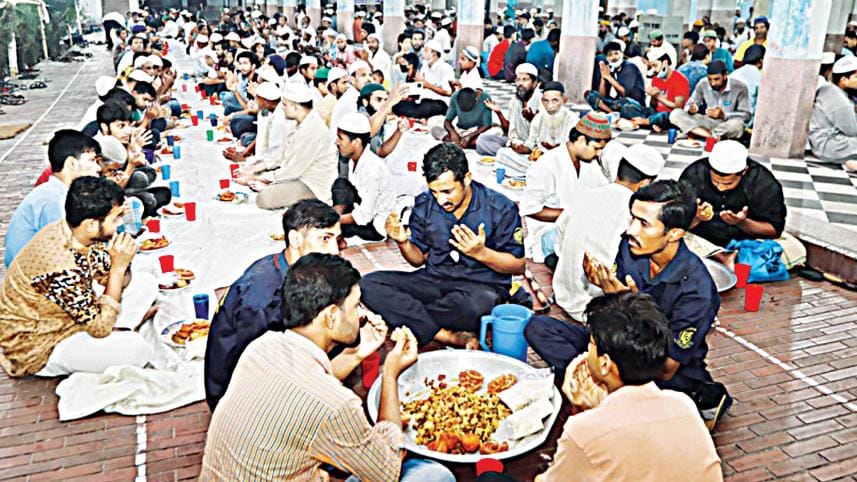A different Dhaka in Ramadan

Have you ever felt the pulse of Dhaka in Ramadan? The way this unforgiving city pauses just before sunset? As if it's holding its breath with the rest of us, then exhaling in unison with the call to prayer?
If you're an unlucky officegoer like me, you probably have felt it already. For a whole month, this restless metropolis, always rushing and buzzing, has moved to a different rhythm, adjusting to the fasts of millions.
This year, the usual office hours have been set from 9:00am to 3:30pm to make fasting easier. However, the traffic in Dhaka is merciless.
The same old fight starts when everyone sets to go home from the office, with thousands of people stuck in traffic, anxiously watching the clock, and silently praying to make it home in time for iftar.
And then, just when frustration peaks, the long-awaited thing happens -- the Maghrib call to prayer.
For a moment, everything starts feeling a little kinder. People who may never have spoken to each other exchange water and dates. After all, it's the time for iftar.
Food packets are passed from one rickshaw puller to another. Traffic cops who were just directing irate crowds now give out water bottles to anyone in the area. People who couldn't make it home in time shows kindness to each other.

If you are a silent observer like me, then you may notice suited men in cars sharing their dates with rickshaw pullers. A young woman, caught in the gridlock, accepting a bottle of water from a traffic police officer. A CNG driver and a university student, bound by nothing but the same empty stomach, breaking their fast side by side. It is Dhaka at its finest -- raw, real, and deeply humane.
Interestingly, it's not just the streets that change -- markets and bazars take on a whole new rhythm too. As iftar approaches, vendors set up temporary seating on the ground, ready to break their fast right where they work. Those who couldn't manage to buy food are welcome to share a meal with strangers, because during this time, no one eats alone. Mosques that stay quiet for most of the year suddenly overflow with life. Even in residential areas, families set up water filters filled with sharbat or juice outside their homes, making sure that anyone passing by can take a sip and cool down. The whole city moves with a shared spirit of generosity and togetherness during this sunset!
The busy junction points, like Bijoy Sharani, Shahbagh, or Dhanmondi 27, magically calm down right before iftar. One minute, it's all honking, yelling, and last-minute lane-cutting -- then silence. The roads empty out like a classroom right after the last bell. It's an odd, almost serene experience!
To me, Ramadan in Dhaka is all about these quiet moments between the rush, the softening of the edges, and the collective act of slowing down. But like all beautiful things, Ramadan in Dhaka will go away. The old habits will come back. The honking during the sunsets will return. The jostling, the shoving, the frenzied race against time -- they will all make a comeback. The iftar stalls will disappear, and with them, so will the quiet camaraderie that binds this city together at sunset.
And yet, for those of us who have felt it -- the warmth of a stranger's generosity, the silence of a city at peace, the magic of a moment shared -- we carry a flicker of hope. Hope that perhaps, even when Ramadan is gone, we will remember. Remember to pause. Remember to be kind. Remember that Dhaka, even in its chaos, can still come together, if only for a moment, at sunset.



 For all latest news, follow The Daily Star's Google News channel.
For all latest news, follow The Daily Star's Google News channel.
Comments